Religions Essay: Exploring Beliefs in Judaism, Christianity, and Islam
VerifiedAdded on 2022/08/23
|8
|1903
|37
Essay
AI Summary
This essay provides a comparative analysis of three major world religions: Judaism, Christianity, and Islam. It examines their differing beliefs about God, their views on spiritual practices, and their core values, drawing from William P. Young's book 'The World's Religions.' The essay explores the unique perspectives of each religion, including Judaism's emphasis on the covenant with God and ethical living, Christianity's belief in the Trinity and Jesus Christ, and Islam's focus on Allah and the teachings of the Quran. The essay highlights the similarities and differences in their approaches to faith, worship, and the concept of the afterlife, offering a comprehensive overview of these influential religions. The essay also touches upon key aspects such as the founders, religious texts, and the relationship between the religions.
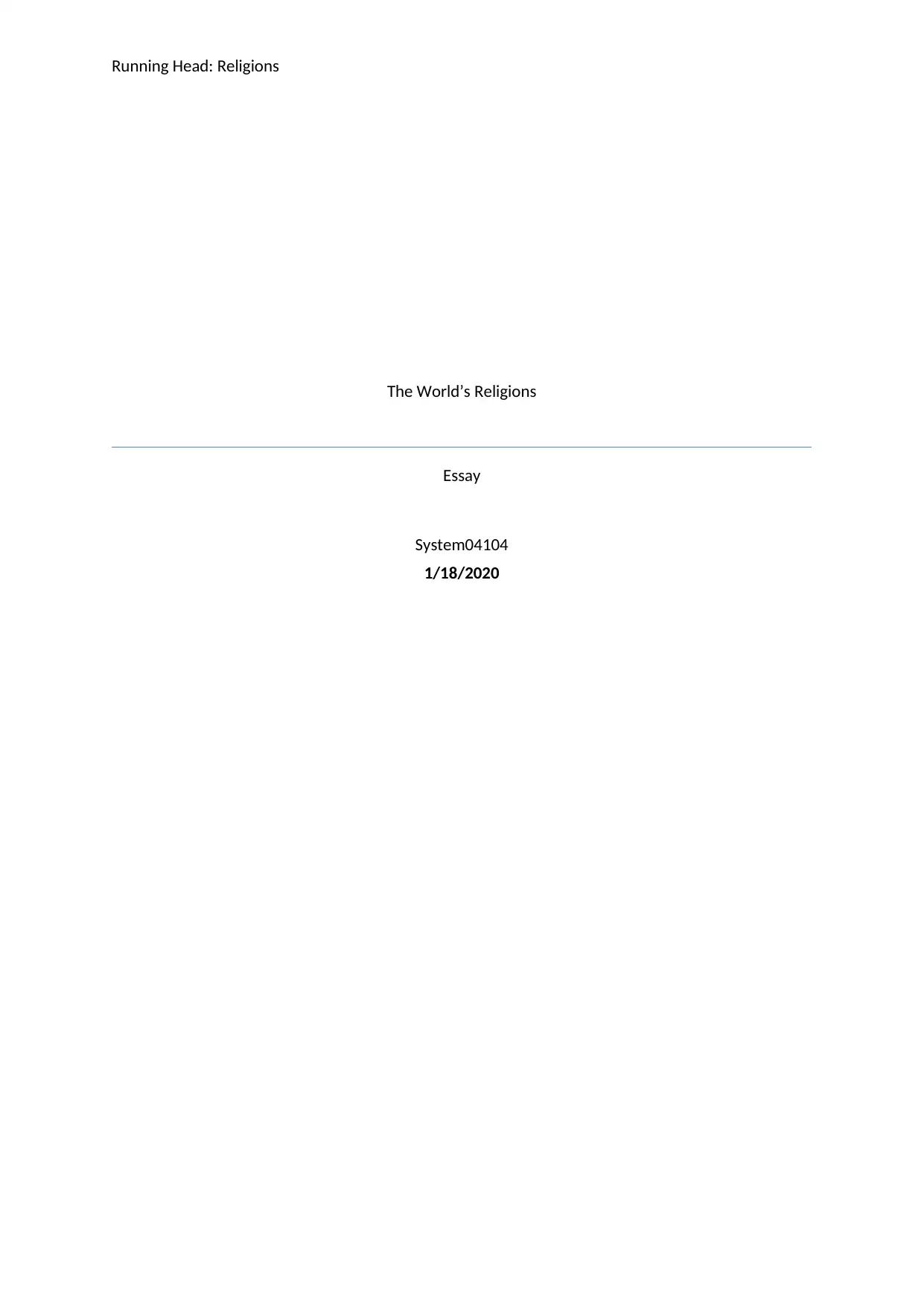
Running Head: Religions
The World’s Religions
Essay
System04104
1/18/2020
The World’s Religions
Essay
System04104
1/18/2020
Paraphrase This Document
Need a fresh take? Get an instant paraphrase of this document with our AI Paraphraser
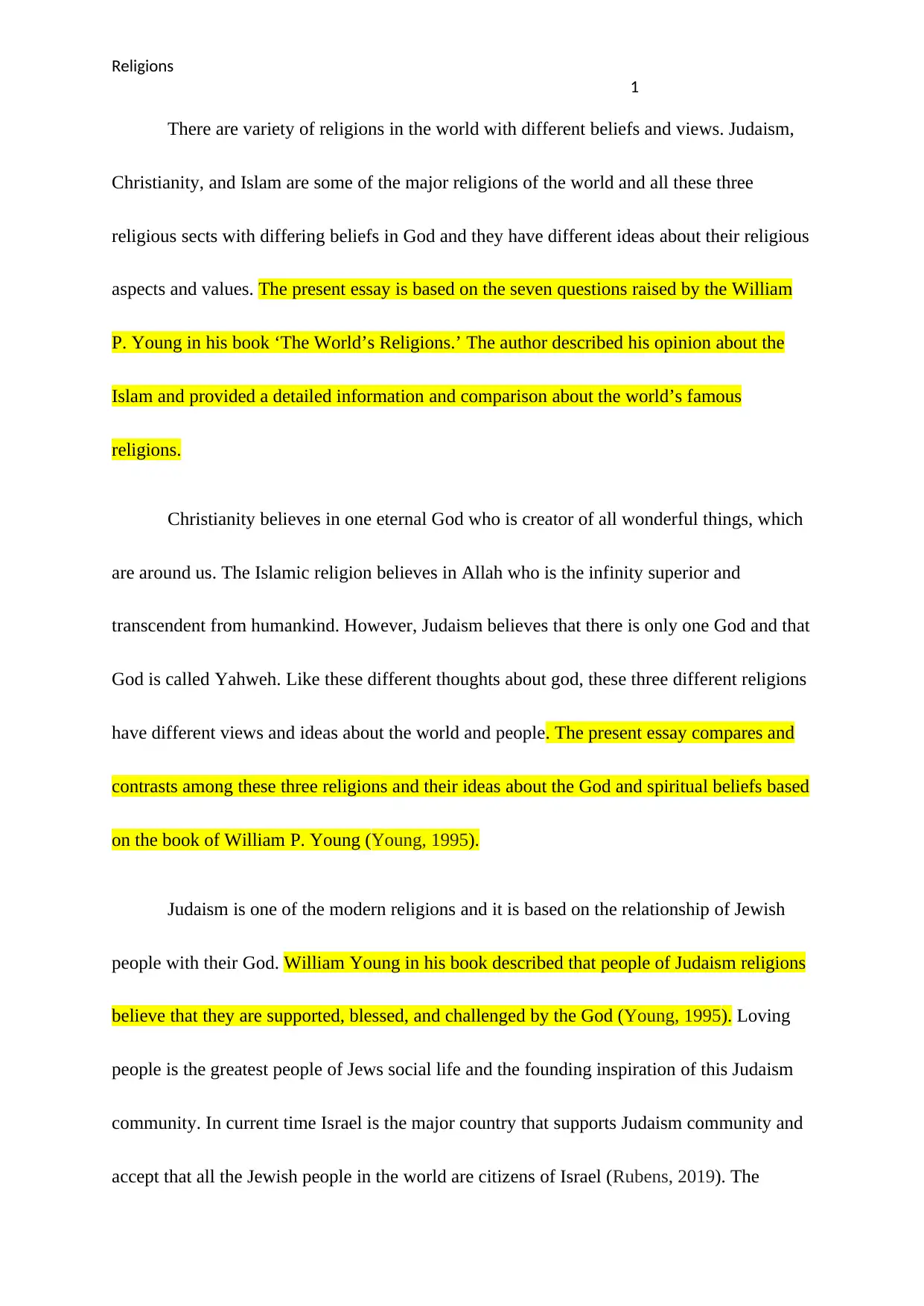
Religions
1
There are variety of religions in the world with different beliefs and views. Judaism,
Christianity, and Islam are some of the major religions of the world and all these three
religious sects with differing beliefs in God and they have different ideas about their religious
aspects and values. The present essay is based on the seven questions raised by the William
P. Young in his book ‘The World’s Religions.’ The author described his opinion about the
Islam and provided a detailed information and comparison about the world’s famous
religions.
Christianity believes in one eternal God who is creator of all wonderful things, which
are around us. The Islamic religion believes in Allah who is the infinity superior and
transcendent from humankind. However, Judaism believes that there is only one God and that
God is called Yahweh. Like these different thoughts about god, these three different religions
have different views and ideas about the world and people. The present essay compares and
contrasts among these three religions and their ideas about the God and spiritual beliefs based
on the book of William P. Young (Young, 1995).
Judaism is one of the modern religions and it is based on the relationship of Jewish
people with their God. William Young in his book described that people of Judaism religions
believe that they are supported, blessed, and challenged by the God (Young, 1995). Loving
people is the greatest people of Jews social life and the founding inspiration of this Judaism
community. In current time Israel is the major country that supports Judaism community and
accept that all the Jewish people in the world are citizens of Israel (Rubens, 2019). The
1
There are variety of religions in the world with different beliefs and views. Judaism,
Christianity, and Islam are some of the major religions of the world and all these three
religious sects with differing beliefs in God and they have different ideas about their religious
aspects and values. The present essay is based on the seven questions raised by the William
P. Young in his book ‘The World’s Religions.’ The author described his opinion about the
Islam and provided a detailed information and comparison about the world’s famous
religions.
Christianity believes in one eternal God who is creator of all wonderful things, which
are around us. The Islamic religion believes in Allah who is the infinity superior and
transcendent from humankind. However, Judaism believes that there is only one God and that
God is called Yahweh. Like these different thoughts about god, these three different religions
have different views and ideas about the world and people. The present essay compares and
contrasts among these three religions and their ideas about the God and spiritual beliefs based
on the book of William P. Young (Young, 1995).
Judaism is one of the modern religions and it is based on the relationship of Jewish
people with their God. William Young in his book described that people of Judaism religions
believe that they are supported, blessed, and challenged by the God (Young, 1995). Loving
people is the greatest people of Jews social life and the founding inspiration of this Judaism
community. In current time Israel is the major country that supports Judaism community and
accept that all the Jewish people in the world are citizens of Israel (Rubens, 2019). The
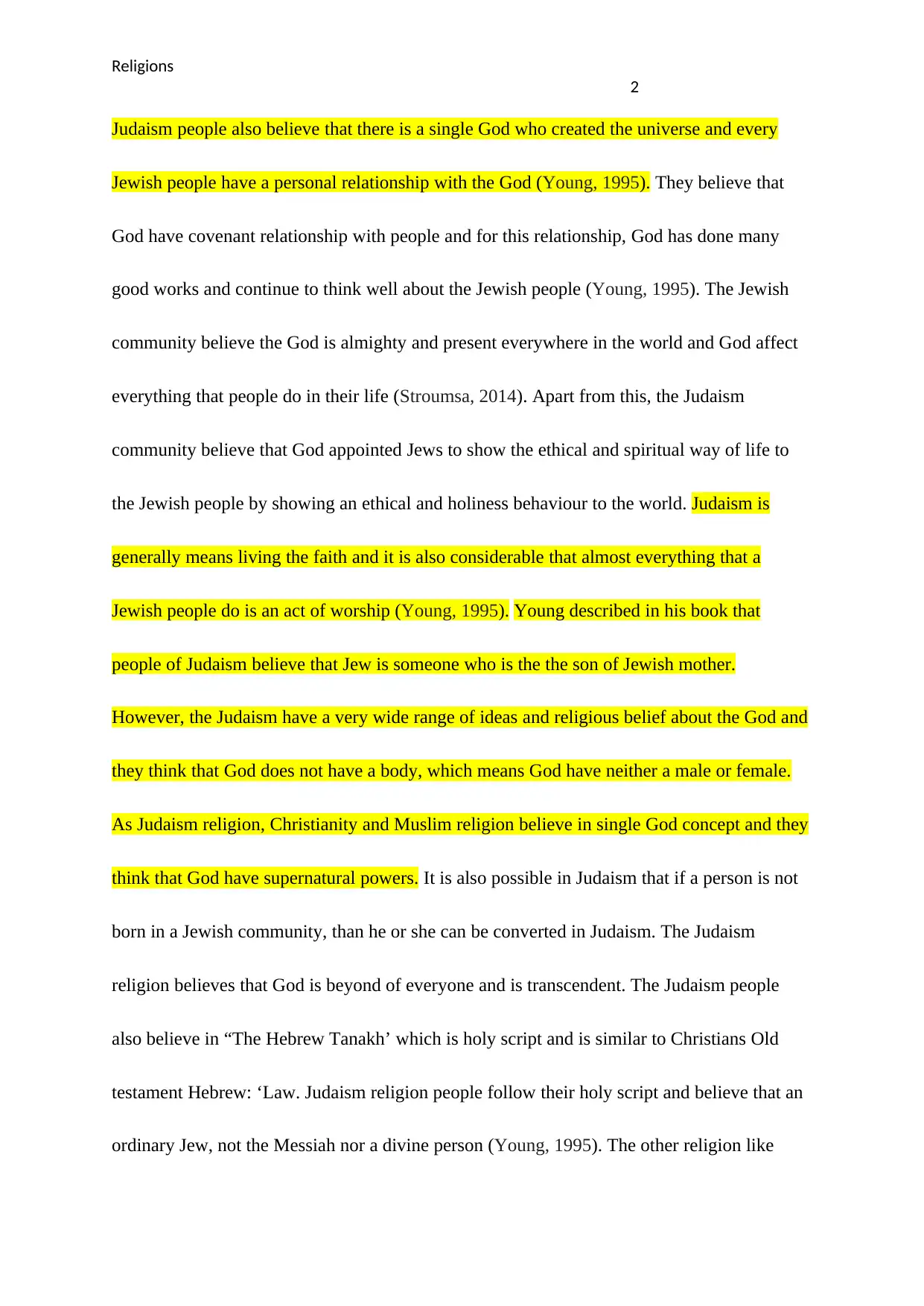
Religions
2
Judaism people also believe that there is a single God who created the universe and every
Jewish people have a personal relationship with the God (Young, 1995). They believe that
God have covenant relationship with people and for this relationship, God has done many
good works and continue to think well about the Jewish people (Young, 1995). The Jewish
community believe the God is almighty and present everywhere in the world and God affect
everything that people do in their life (Stroumsa, 2014). Apart from this, the Judaism
community believe that God appointed Jews to show the ethical and spiritual way of life to
the Jewish people by showing an ethical and holiness behaviour to the world. Judaism is
generally means living the faith and it is also considerable that almost everything that a
Jewish people do is an act of worship (Young, 1995). Young described in his book that
people of Judaism believe that Jew is someone who is the the son of Jewish mother.
However, the Judaism have a very wide range of ideas and religious belief about the God and
they think that God does not have a body, which means God have neither a male or female.
As Judaism religion, Christianity and Muslim religion believe in single God concept and they
think that God have supernatural powers. It is also possible in Judaism that if a person is not
born in a Jewish community, than he or she can be converted in Judaism. The Judaism
religion believes that God is beyond of everyone and is transcendent. The Judaism people
also believe in “The Hebrew Tanakh’ which is holy script and is similar to Christians Old
testament Hebrew: ‘Law. Judaism religion people follow their holy script and believe that an
ordinary Jew, not the Messiah nor a divine person (Young, 1995). The other religion like
2
Judaism people also believe that there is a single God who created the universe and every
Jewish people have a personal relationship with the God (Young, 1995). They believe that
God have covenant relationship with people and for this relationship, God has done many
good works and continue to think well about the Jewish people (Young, 1995). The Jewish
community believe the God is almighty and present everywhere in the world and God affect
everything that people do in their life (Stroumsa, 2014). Apart from this, the Judaism
community believe that God appointed Jews to show the ethical and spiritual way of life to
the Jewish people by showing an ethical and holiness behaviour to the world. Judaism is
generally means living the faith and it is also considerable that almost everything that a
Jewish people do is an act of worship (Young, 1995). Young described in his book that
people of Judaism believe that Jew is someone who is the the son of Jewish mother.
However, the Judaism have a very wide range of ideas and religious belief about the God and
they think that God does not have a body, which means God have neither a male or female.
As Judaism religion, Christianity and Muslim religion believe in single God concept and they
think that God have supernatural powers. It is also possible in Judaism that if a person is not
born in a Jewish community, than he or she can be converted in Judaism. The Judaism
religion believes that God is beyond of everyone and is transcendent. The Judaism people
also believe in “The Hebrew Tanakh’ which is holy script and is similar to Christians Old
testament Hebrew: ‘Law. Judaism religion people follow their holy script and believe that an
ordinary Jew, not the Messiah nor a divine person (Young, 1995). The other religion like
⊘ This is a preview!⊘
Do you want full access?
Subscribe today to unlock all pages.

Trusted by 1+ million students worldwide
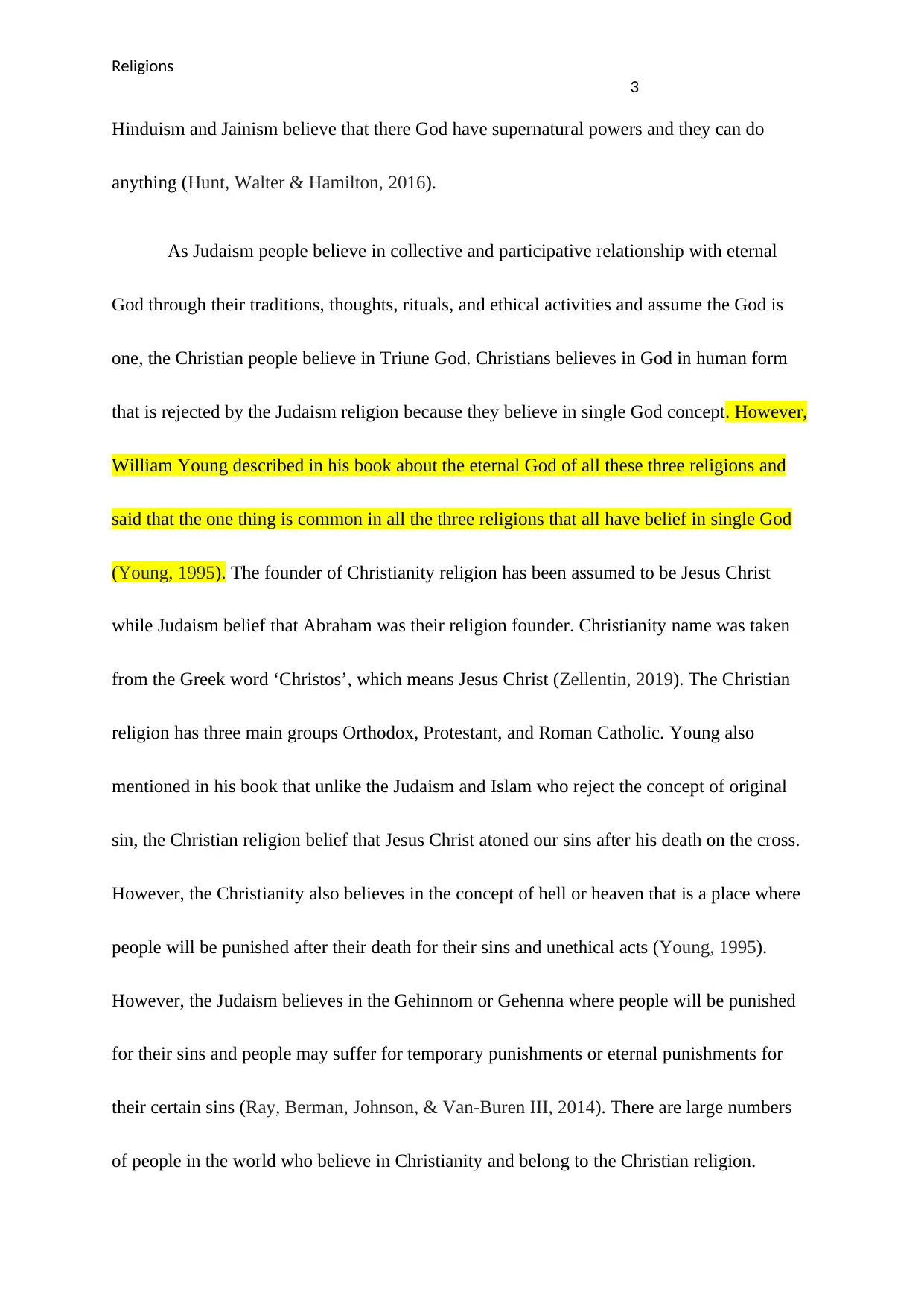
Religions
3
Hinduism and Jainism believe that there God have supernatural powers and they can do
anything (Hunt, Walter & Hamilton, 2016).
As Judaism people believe in collective and participative relationship with eternal
God through their traditions, thoughts, rituals, and ethical activities and assume the God is
one, the Christian people believe in Triune God. Christians believes in God in human form
that is rejected by the Judaism religion because they believe in single God concept. However,
William Young described in his book about the eternal God of all these three religions and
said that the one thing is common in all the three religions that all have belief in single God
(Young, 1995). The founder of Christianity religion has been assumed to be Jesus Christ
while Judaism belief that Abraham was their religion founder. Christianity name was taken
from the Greek word ‘Christos’, which means Jesus Christ (Zellentin, 2019). The Christian
religion has three main groups Orthodox, Protestant, and Roman Catholic. Young also
mentioned in his book that unlike the Judaism and Islam who reject the concept of original
sin, the Christian religion belief that Jesus Christ atoned our sins after his death on the cross.
However, the Christianity also believes in the concept of hell or heaven that is a place where
people will be punished after their death for their sins and unethical acts (Young, 1995).
However, the Judaism believes in the Gehinnom or Gehenna where people will be punished
for their sins and people may suffer for temporary punishments or eternal punishments for
their certain sins (Ray, Berman, Johnson, & Van-Buren III, 2014). There are large numbers
of people in the world who believe in Christianity and belong to the Christian religion.
3
Hinduism and Jainism believe that there God have supernatural powers and they can do
anything (Hunt, Walter & Hamilton, 2016).
As Judaism people believe in collective and participative relationship with eternal
God through their traditions, thoughts, rituals, and ethical activities and assume the God is
one, the Christian people believe in Triune God. Christians believes in God in human form
that is rejected by the Judaism religion because they believe in single God concept. However,
William Young described in his book about the eternal God of all these three religions and
said that the one thing is common in all the three religions that all have belief in single God
(Young, 1995). The founder of Christianity religion has been assumed to be Jesus Christ
while Judaism belief that Abraham was their religion founder. Christianity name was taken
from the Greek word ‘Christos’, which means Jesus Christ (Zellentin, 2019). The Christian
religion has three main groups Orthodox, Protestant, and Roman Catholic. Young also
mentioned in his book that unlike the Judaism and Islam who reject the concept of original
sin, the Christian religion belief that Jesus Christ atoned our sins after his death on the cross.
However, the Christianity also believes in the concept of hell or heaven that is a place where
people will be punished after their death for their sins and unethical acts (Young, 1995).
However, the Judaism believes in the Gehinnom or Gehenna where people will be punished
for their sins and people may suffer for temporary punishments or eternal punishments for
their certain sins (Ray, Berman, Johnson, & Van-Buren III, 2014). There are large numbers
of people in the world who believe in Christianity and belong to the Christian religion.
Paraphrase This Document
Need a fresh take? Get an instant paraphrase of this document with our AI Paraphraser
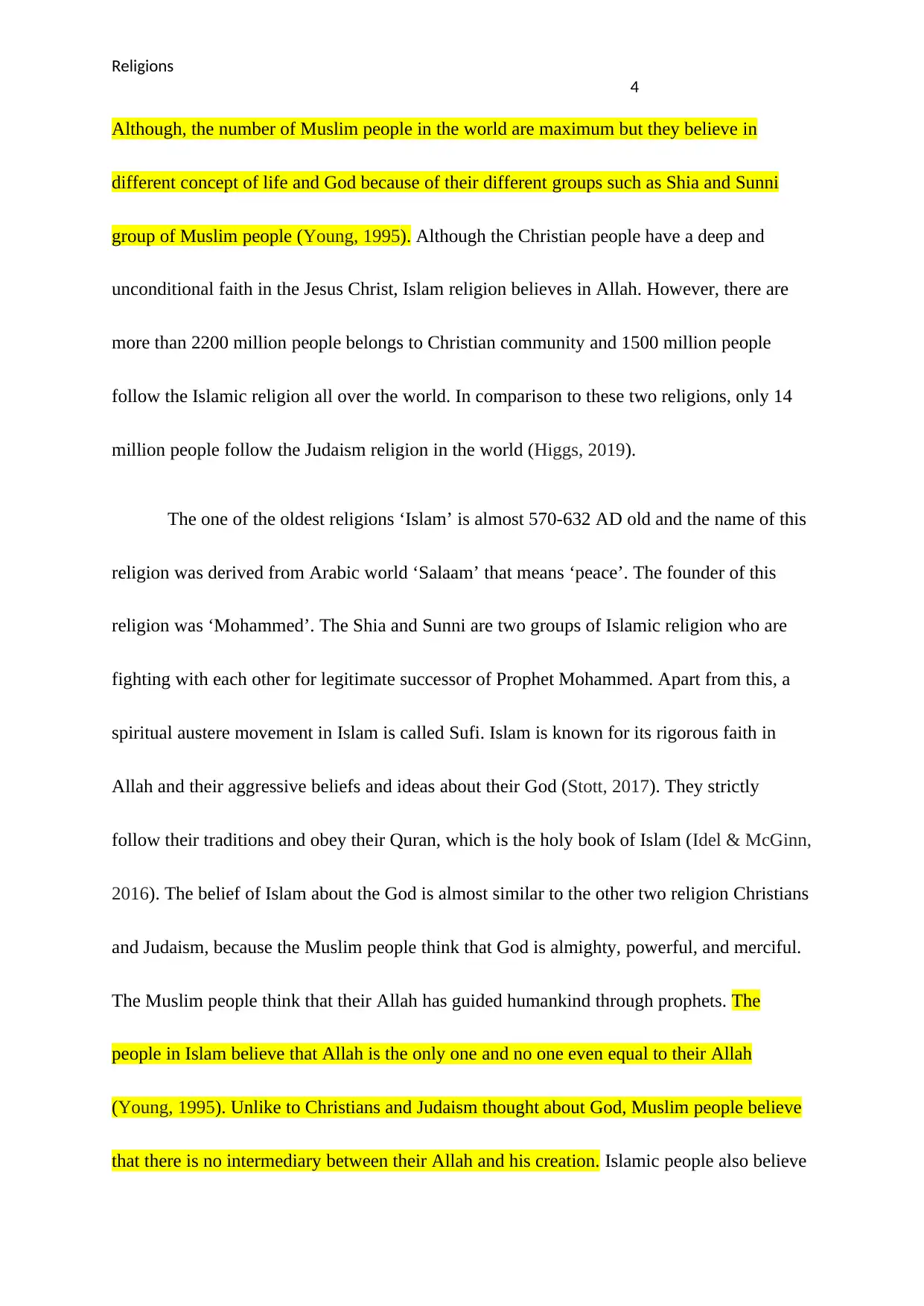
Religions
4
Although, the number of Muslim people in the world are maximum but they believe in
different concept of life and God because of their different groups such as Shia and Sunni
group of Muslim people (Young, 1995). Although the Christian people have a deep and
unconditional faith in the Jesus Christ, Islam religion believes in Allah. However, there are
more than 2200 million people belongs to Christian community and 1500 million people
follow the Islamic religion all over the world. In comparison to these two religions, only 14
million people follow the Judaism religion in the world (Higgs, 2019).
The one of the oldest religions ‘Islam’ is almost 570-632 AD old and the name of this
religion was derived from Arabic world ‘Salaam’ that means ‘peace’. The founder of this
religion was ‘Mohammed’. The Shia and Sunni are two groups of Islamic religion who are
fighting with each other for legitimate successor of Prophet Mohammed. Apart from this, a
spiritual austere movement in Islam is called Sufi. Islam is known for its rigorous faith in
Allah and their aggressive beliefs and ideas about their God (Stott, 2017). They strictly
follow their traditions and obey their Quran, which is the holy book of Islam (Idel & McGinn,
2016). The belief of Islam about the God is almost similar to the other two religion Christians
and Judaism, because the Muslim people think that God is almighty, powerful, and merciful.
The Muslim people think that their Allah has guided humankind through prophets. The
people in Islam believe that Allah is the only one and no one even equal to their Allah
(Young, 1995). Unlike to Christians and Judaism thought about God, Muslim people believe
that there is no intermediary between their Allah and his creation. Islamic people also believe
4
Although, the number of Muslim people in the world are maximum but they believe in
different concept of life and God because of their different groups such as Shia and Sunni
group of Muslim people (Young, 1995). Although the Christian people have a deep and
unconditional faith in the Jesus Christ, Islam religion believes in Allah. However, there are
more than 2200 million people belongs to Christian community and 1500 million people
follow the Islamic religion all over the world. In comparison to these two religions, only 14
million people follow the Judaism religion in the world (Higgs, 2019).
The one of the oldest religions ‘Islam’ is almost 570-632 AD old and the name of this
religion was derived from Arabic world ‘Salaam’ that means ‘peace’. The founder of this
religion was ‘Mohammed’. The Shia and Sunni are two groups of Islamic religion who are
fighting with each other for legitimate successor of Prophet Mohammed. Apart from this, a
spiritual austere movement in Islam is called Sufi. Islam is known for its rigorous faith in
Allah and their aggressive beliefs and ideas about their God (Stott, 2017). They strictly
follow their traditions and obey their Quran, which is the holy book of Islam (Idel & McGinn,
2016). The belief of Islam about the God is almost similar to the other two religion Christians
and Judaism, because the Muslim people think that God is almighty, powerful, and merciful.
The Muslim people think that their Allah has guided humankind through prophets. The
people in Islam believe that Allah is the only one and no one even equal to their Allah
(Young, 1995). Unlike to Christians and Judaism thought about God, Muslim people believe
that there is no intermediary between their Allah and his creation. Islamic people also believe
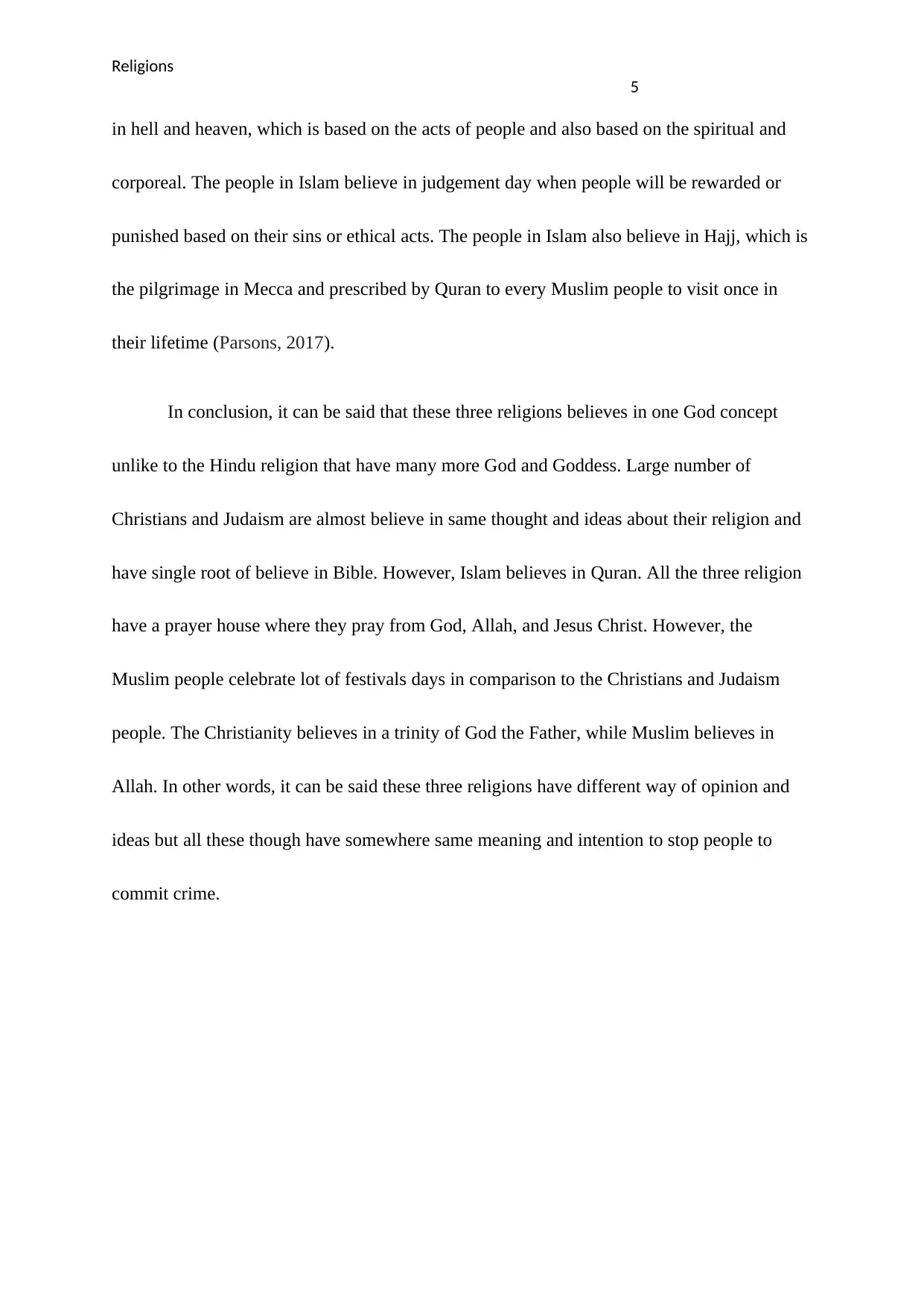
Religions
5
in hell and heaven, which is based on the acts of people and also based on the spiritual and
corporeal. The people in Islam believe in judgement day when people will be rewarded or
punished based on their sins or ethical acts. The people in Islam also believe in Hajj, which is
the pilgrimage in Mecca and prescribed by Quran to every Muslim people to visit once in
their lifetime (Parsons, 2017).
In conclusion, it can be said that these three religions believes in one God concept
unlike to the Hindu religion that have many more God and Goddess. Large number of
Christians and Judaism are almost believe in same thought and ideas about their religion and
have single root of believe in Bible. However, Islam believes in Quran. All the three religion
have a prayer house where they pray from God, Allah, and Jesus Christ. However, the
Muslim people celebrate lot of festivals days in comparison to the Christians and Judaism
people. The Christianity believes in a trinity of God the Father, while Muslim believes in
Allah. In other words, it can be said these three religions have different way of opinion and
ideas but all these though have somewhere same meaning and intention to stop people to
commit crime.
5
in hell and heaven, which is based on the acts of people and also based on the spiritual and
corporeal. The people in Islam believe in judgement day when people will be rewarded or
punished based on their sins or ethical acts. The people in Islam also believe in Hajj, which is
the pilgrimage in Mecca and prescribed by Quran to every Muslim people to visit once in
their lifetime (Parsons, 2017).
In conclusion, it can be said that these three religions believes in one God concept
unlike to the Hindu religion that have many more God and Goddess. Large number of
Christians and Judaism are almost believe in same thought and ideas about their religion and
have single root of believe in Bible. However, Islam believes in Quran. All the three religion
have a prayer house where they pray from God, Allah, and Jesus Christ. However, the
Muslim people celebrate lot of festivals days in comparison to the Christians and Judaism
people. The Christianity believes in a trinity of God the Father, while Muslim believes in
Allah. In other words, it can be said these three religions have different way of opinion and
ideas but all these though have somewhere same meaning and intention to stop people to
commit crime.
⊘ This is a preview!⊘
Do you want full access?
Subscribe today to unlock all pages.

Trusted by 1+ million students worldwide
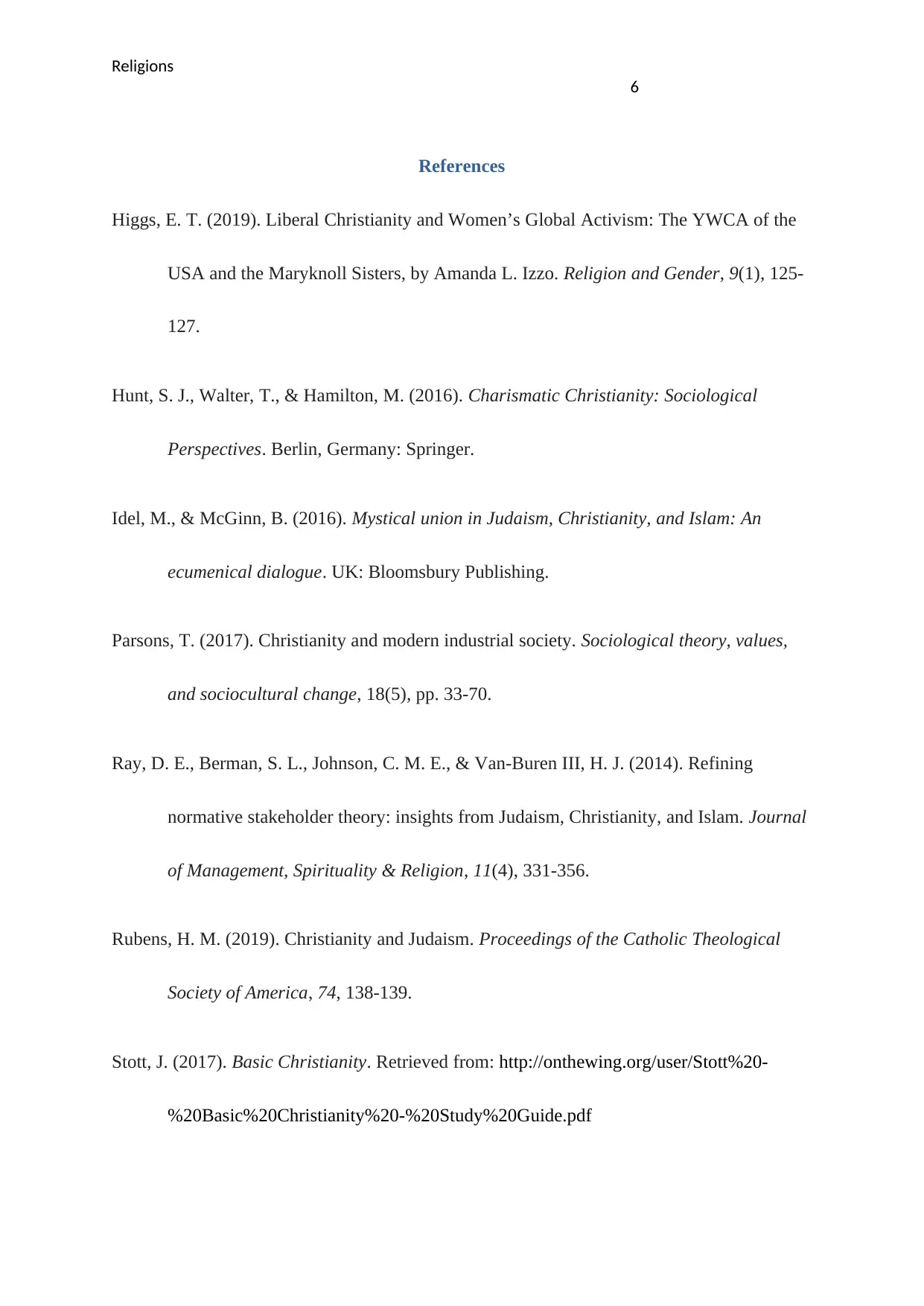
Religions
6
References
Higgs, E. T. (2019). Liberal Christianity and Women’s Global Activism: The YWCA of the
USA and the Maryknoll Sisters, by Amanda L. Izzo. Religion and Gender, 9(1), 125-
127.
Hunt, S. J., Walter, T., & Hamilton, M. (2016). Charismatic Christianity: Sociological
Perspectives. Berlin, Germany: Springer.
Idel, M., & McGinn, B. (2016). Mystical union in Judaism, Christianity, and Islam: An
ecumenical dialogue. UK: Bloomsbury Publishing.
Parsons, T. (2017). Christianity and modern industrial society. Sociological theory, values,
and sociocultural change, 18(5), pp. 33-70.
Ray, D. E., Berman, S. L., Johnson, C. M. E., & Van-Buren III, H. J. (2014). Refining
normative stakeholder theory: insights from Judaism, Christianity, and Islam. Journal
of Management, Spirituality & Religion, 11(4), 331-356.
Rubens, H. M. (2019). Christianity and Judaism. Proceedings of the Catholic Theological
Society of America, 74, 138-139.
Stott, J. (2017). Basic Christianity. Retrieved from: http://onthewing.org/user/Stott%20-
%20Basic%20Christianity%20-%20Study%20Guide.pdf
6
References
Higgs, E. T. (2019). Liberal Christianity and Women’s Global Activism: The YWCA of the
USA and the Maryknoll Sisters, by Amanda L. Izzo. Religion and Gender, 9(1), 125-
127.
Hunt, S. J., Walter, T., & Hamilton, M. (2016). Charismatic Christianity: Sociological
Perspectives. Berlin, Germany: Springer.
Idel, M., & McGinn, B. (2016). Mystical union in Judaism, Christianity, and Islam: An
ecumenical dialogue. UK: Bloomsbury Publishing.
Parsons, T. (2017). Christianity and modern industrial society. Sociological theory, values,
and sociocultural change, 18(5), pp. 33-70.
Ray, D. E., Berman, S. L., Johnson, C. M. E., & Van-Buren III, H. J. (2014). Refining
normative stakeholder theory: insights from Judaism, Christianity, and Islam. Journal
of Management, Spirituality & Religion, 11(4), 331-356.
Rubens, H. M. (2019). Christianity and Judaism. Proceedings of the Catholic Theological
Society of America, 74, 138-139.
Stott, J. (2017). Basic Christianity. Retrieved from: http://onthewing.org/user/Stott%20-
%20Basic%20Christianity%20-%20Study%20Guide.pdf
Paraphrase This Document
Need a fresh take? Get an instant paraphrase of this document with our AI Paraphraser
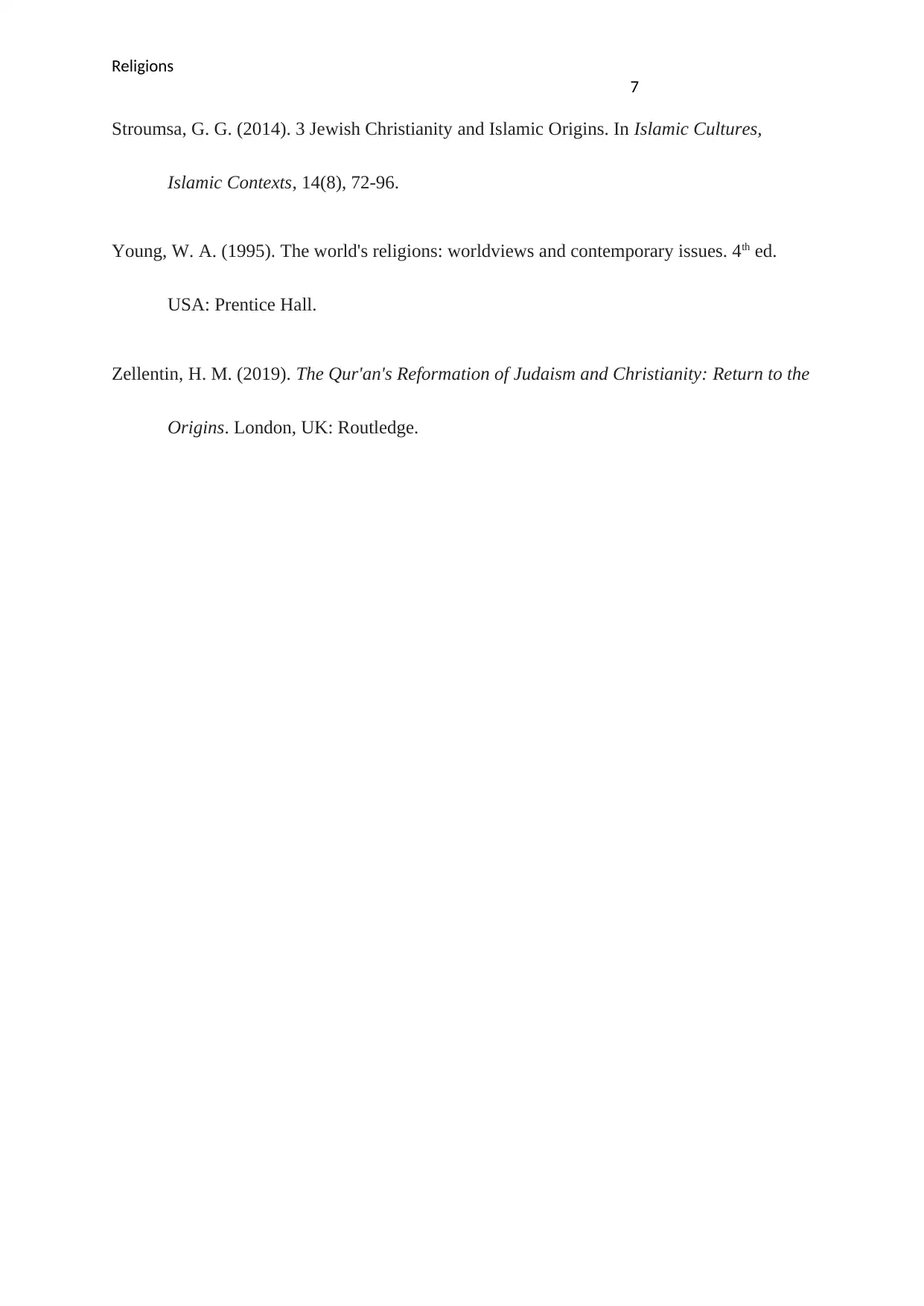
Religions
7
Stroumsa, G. G. (2014). 3 Jewish Christianity and Islamic Origins. In Islamic Cultures,
Islamic Contexts, 14(8), 72-96.
Young, W. A. (1995). The world's religions: worldviews and contemporary issues. 4th ed.
USA: Prentice Hall.
Zellentin, H. M. (2019). The Qur'an's Reformation of Judaism and Christianity: Return to the
Origins. London, UK: Routledge.
7
Stroumsa, G. G. (2014). 3 Jewish Christianity and Islamic Origins. In Islamic Cultures,
Islamic Contexts, 14(8), 72-96.
Young, W. A. (1995). The world's religions: worldviews and contemporary issues. 4th ed.
USA: Prentice Hall.
Zellentin, H. M. (2019). The Qur'an's Reformation of Judaism and Christianity: Return to the
Origins. London, UK: Routledge.
1 out of 8
Related Documents
Your All-in-One AI-Powered Toolkit for Academic Success.
+13062052269
info@desklib.com
Available 24*7 on WhatsApp / Email
![[object Object]](/_next/static/media/star-bottom.7253800d.svg)
Unlock your academic potential
Copyright © 2020–2025 A2Z Services. All Rights Reserved. Developed and managed by ZUCOL.





